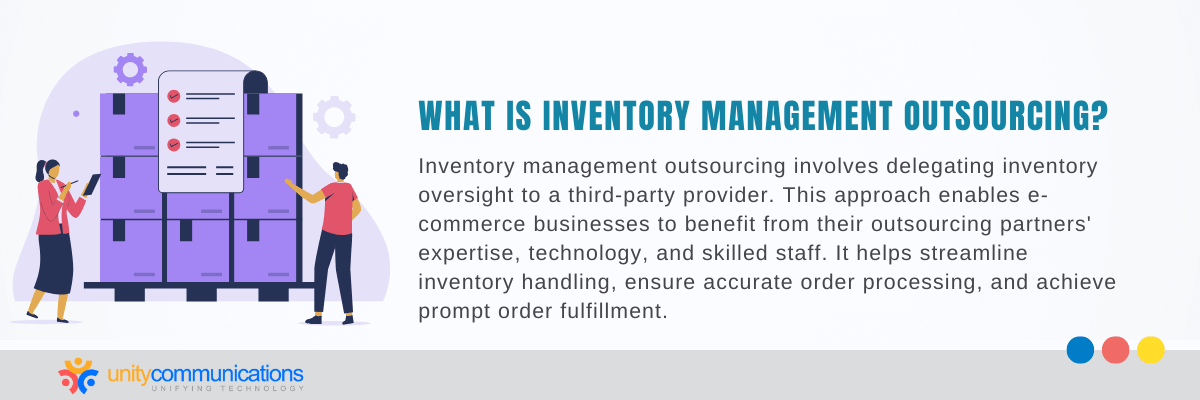Table of Contents
Effective inventory management is essential for a successful e-commerce business. It ensures product availability, optimizes storage costs, and avoids overstocking, thus maintaining operational efficiency and customer satisfaction.
Leveraging business process outsourcing (BPO) services is the best way to achieve seamless inventory management. Service providers have the expertise and resources to offer smooth back-office operations, empowering e-commerce companies to remain competitive and meet customer expectations.
Keep reading to explore how back-office outsourcing services can significantly improve inventory management for e-commerce!
What is inventory management outsourcing?

Delegating the responsibilities of overseeing inventory to a third party—this is what BPO in inventory management is. This strategy allows e-commerce businesses to leverage their outsourcing partners’ specialized staff, technologies, and industry expertise to handle inventory efficiently, process orders accurately, and fulfill orders promptly.
Challenges in managing inventory in e-commerce
Katana’s 2024 E-commerce Performance Report on Shopify merchants surveyed over 100 small and medium-sized e-commerce leaders in the United States and Canada. Ninety-eight percent struggled to align inventory and production with changing consumer demand. Of these respondents, 60% reported facing significant difficulties in this area.
Here are some of the challenges of e-commerce companies when it comes to inventory:
- Demand forecasting. Rapidly changing consumer preferences, market trends, and external factors such as economic shifts make it difficult to predict accurate inventory and production needs.
- Inventory visibility. Maintaining real-time inventory visibility across multiple sales channels and warehouses is a significant challenge. Inadequate inventory tracking can result in discrepancies, order fulfillment delays, and shrinkage.
- Order fulfillment speed. Meeting customer expectations for fast delivery requires efficient order processing and shipping. Managing this process in-house can be resource-intensive and prone to delays, especially during peak seasons or promotional events.
- Returns management. Efficiently handling product returns is crucial for maintaining customer trust and satisfaction. Poorly managed returns processes can lead to operational bottlenecks, increased costs, and negative customer experiences.
When should you partner with a BPO firm for inventory management?

Companies will know it is time to bring on an outsourcing partner when these challenges become overwhelming. If inefficiencies, inaccuracies, or time-consuming processes are hindering the ability to scale, outsourcing can provide the expertise and tools needed to streamline inventory management.
By partnering with a BPO firm, businesses can leverage specialized solutions to address these pain points effectively. Here are ways a BPO firm can solve these inventory management issues:
Improves operational efficiency
Outsourcing inventory management allows businesses to benefit from the advanced systems and processes of specialized providers. BPO firms use sophisticated software and automated systems to track inventory, manage orders, and guarantee timely deliveries, resulting in smoother and faster operations.
Enhances accuracy
Outsourcing to a BPO firm ensures the use of both skilled data entry specialists and advanced artificial intelligence (AI)-driven inventory management tools to minimize errors like overstocking, understocking, and misplacements.
Companies can maintain precise stock levels, ensuring products are readily available and orders are processed efficiently, ultimately boosting customer satisfaction.
Promotes scalability and flexibility
As e-commerce companies experience seasonal spikes or unexpected surges in demand, inventory management outsourcing offers the flexibility to scale operations quickly and efficiently. This adaptability helps them to meet customer demands without the delays and complications associated with in-house scaling.
Ensures cost optimization
Outsourcing inventory management significantly reduces staffing and technology costs for e-commerce businesses. Third-party providers offer economies of scale, allowing businesses to save on overhead costs while accessing high-quality support that might otherwise be cost-prohibitive.
Guarantees customer satisfaction
Boosting BPO inventory management operations with outsourced e-commerce customer service ensures faster order fulfillment, better returns processing, and improved inquiry responses. This quality of experience guarantees higher customer satisfaction and loyalty for e-commerce businesses.
Inventory management outsourcing provides e-commerce companies with the right tools and expertise. Embracing this approach leads to sustained success and a stronger competitive position in the ever-evolving e-commerce landscape.
What inventory management tasks can be outsourced?

Outsourcing inventory management allows e-commerce businesses to delegate crucial tasks to specialized providers, enhancing efficiency and overall operations.
A third-party virtual assistant (VA) plays a vital role in inventory management outsourcing by remotely managing various administrative and operational tasks. VAs monitor inventory levels, update records, track stock movements, and assist with order processing and supplier coordination.
Outsourcing back-office operations is also possible with a VA. They take over administrative tasks like inventory reporting and data entry, allowing e-commerce businesses to concentrate on their core functions.
In addition to the tasks mentioned, a VA can provide several other valuable services in inventory management outsourcing:
- Demand forecasting. VAs can analyze historical sales data and trends to predict future inventory needs, helping businesses maintain optimal stock levels. By accurately forecasting demand, they prevent both stockouts and excess inventory.
- Returns and exchanges management. VAs can process and manage product returns or exchanges, ensuring smooth and timely handling of customer requests. They coordinate with the warehouse for returns processing and update inventory records to reflect returned items.
- Vendor performance tracking. VAs can monitor supplier performance, ensuring timely deliveries and adherence to quality standards. They also track metrics such as order accuracy and delivery times, providing feedback to suppliers and helping resolve any issues that arise.
- Inventory system updates. They can maintain inventory management software, ensuring data accuracy and system functionality for smooth operations. This includes troubleshooting technical issues, implementing software updates, and optimizing system settings to enhance efficiency.
These additional tasks allow businesses to streamline inventory processes and focus on growth.
How to choose the right inventory management outsourcing partner

Selecting the ideal inventory management outsourcing partner is crucial for enhanced e-commerce operations and seamless supply chain management. To make an informed decision, companies must consider several factors that align with their business needs and objectives:
- Industry experience. Look for a partner with a proven track record and extensive experience in inventory management. Their familiarity with industry-specific challenges and best practices will be invaluable.
- Technology and tools. Assess the partner’s technological capabilities to determine whether they use advanced inventory management systems to meet the business needs.
- Scalability and flexibility. Choose a partner that can scale their services according to business growth and adapt to fluctuations in demand. Flexibility is crucial to accommodate seasonal variations and sudden changes in market conditions.
- Cost and pricing structure. Evaluate the partner’s pricing model to ensure it aligns with the budget and provides transparent pricing without hidden costs. Consider whether the cost justifies the value and quality of services offered.
- Communication and support. Effective communication is vital for a successful partnership. Look for a provider that offers responsive customer support and maintains open lines of communication to address any issues or concerns promptly.
- Reputation and references. Research the partner’s reputation in the industry and seek references or case studies from past clients. Positive testimonials and reviews can provide valuable insights into their reliability and service quality.
- Geographical coverage. Consider the partner’s geographical coverage and distribution network, primarily if the business operates in multiple regions or countries. A partner with a global reach can facilitate efficient international logistics.
- Compliance and security. Ensure the partner complies with industry regulations and standards, particularly regarding data security and inventory handling practices. Verify their certifications and protocols for protecting sensitive information.
- Alignment with business goals. Choose a partner whose values, goals, and approach align with business objectives. A strong cultural fit and shared vision can foster a collaborative and mutually beneficial relationship.
- Trial period or pilot project. Consider starting with a trial period or pilot project to assess the partner’s capabilities and compatibility with the business. This allows the company to evaluate their performance before committing to a long-term partnership.
Carefully evaluating these factors helps businesses choose an inventory management outsourcing partner that meets current needs and supports future growth and success.
Taking the time to select the right partner ensures a mutually beneficial relationship and contributes to the overall efficiency and competitiveness of the e-commerce business.
Evaluating potential partners
A thorough evaluation is essential for successful collaboration with a third-party inventory management firm. Key performance metrics, such as order accuracy, on-time delivery rates, and inventory accuracy, determine the partner’s operational efficiency and reliability.
Furthermore, a careful review of the contract terms and service-level agreements (SLAs) is necessary to understand the scope of services, pricing structure, and provisions for dispute resolution. Conducting audits is also necessary to assess the provider’s infrastructure and adherence to industry regulations and standards.
By employing these evaluation methods, businesses can make informed decisions for a successful inventory management outsourcing initiative.
The bottom line

Outsourcing inventory management to third-party specialists is a strategic move for e-commerce businesses aiming to enhance operational efficiency and customer satisfaction.
Leveraging the expertise, technology, and scalability of specialized providers streamlines e-commerce firms’ inventory processes, reduces costs, and manages fluctuations in demand. It allows companies to focus on their core business activities, driving sustainable growth and success in a competitive market.
Let’s connect and unlock your e-commerce potential by partnering with our inventory management experts today!




